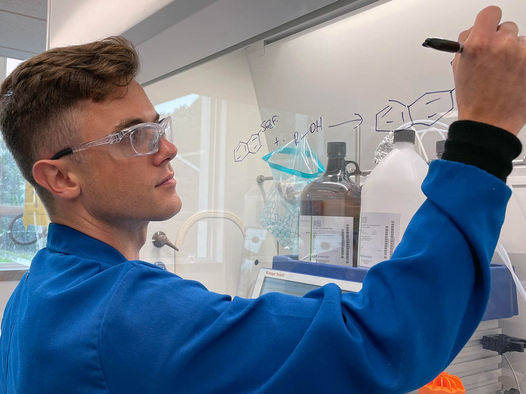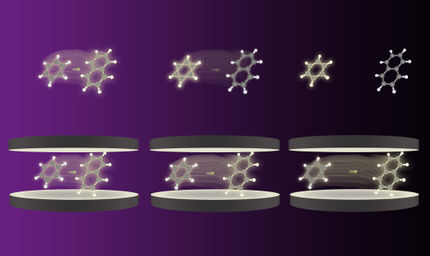Teaching an old chemical new tricks
Using a chemical from the 1980s, CSHL Professor John E. Moses’ team has found a way to create new molecules in minutes
Advertisement
They say you can’t teach an old dog new tricks, but can you do new tricks with old chemical catalysts? Cold Spring Harbor Laboratory Professor John E. Moses and his team have paired a catalyst called “Barton’s base” developed in the 1980s with a new family of chemical reactions. This powerful combination results in a chemical transformation that happens within minutes or even seconds. Their new chemistry can accelerate the generation of complex molecules needed for biomedical research, drug development, and materials science.

Joshua Homer, a postdoctoral researcher in Professor John E. Moses’ group at Cold Spring Harbor Laboratory, seen drawing out a “click” chemistry reaction. Click reactions allow chemists to assemble molecules quickly, reliably, and cleanly.
CSHL
Click chemistry enables chemical building blocks to be joined together quickly, reliably, and cleanly. A click reaction often requires a catalyst to jumpstart it. Barton’s base is so powerful that Moses only needs a small trace of it to spark a reaction. Moses says, “Reducing the amount of catalyst needed for a reaction is cost-effective and beneficial to the environment.”
The new reaction, called accelerated SuFEx click chemistry (ASCC), also allows multiple steps to be skipped in some synthetic pathways, including the synthesis and purification of intermediate molecules. Moses says, “Removing steps has a huge influence on the amount of waste generated from a reaction. The ASCC method will greatly enhance the ‘green credentials’ of SuFEx click chemistry, especially when applied on an industrial scale.”
Moses feels a personal connection to Barton’s base. He says, “Sir Derek Barton, who first prepared Barton’s base in the 1980s, happens to be my academic grandfather.” Barton trained Moses’ Ph.D. advisor Sir Jack E. Baldwin at the University of Oxford. Following in the footsteps of his academic ancestors, Moses and his team continue to come up with more and more new chemistry tricks.




























































